The Healing Touch: Using Humidifiers for Colds and Allergies
Are you sick and tired of the constant sniffles and itchy eyes that come with a cold or allergies? What if we told you there’s a simple home remedy that could help you breathe easier during these conditions? Well, there is — it’s time to talk about Humidifiers for colds and allergies.
Busting the Myths Surrounding the Common Cold and Allergies
Before we plunge into the land of humidity and health, let’s bust some myths surrounding these common woes. Cold is not just the consequence of winter thrills, and allergies are not a hyperactive response to spring blooms alone.
Indoor air quality, particularly humidity levels, plays a significant role in our respiratory health. Moist nasal and throat tissues arrest pathogens and allergens, improving overall respiratory function. Humidifiers are simple yet effective devices that add moisture to our indoor air. Besides making it easier to breathe, they also help maintain glowing skin.
Are you thinking of venturing into the world of Humidifiers? Let’s dive deeper to understand them better. What is a humidifier? Understanding this household appliance and how it helps your health. In essence, a humidifier is a device that increases humidity or moisture levels in a single room or even an entire house.
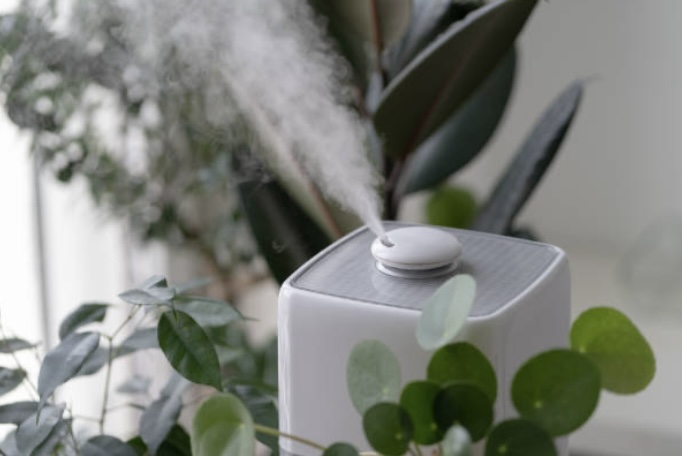
Types of Humidifiers: Exploring the Different Variations
From ultrasonic to evaporative and steam vaporizers, different types of humidifiers cater to various needs and budgets. Features to Consider While Purchasing a Humidifier Look for features like automatic shut-off, adjustable mist levels, and ease of cleaning. Bonus points for devices that offer silent operation! And we love those cool mist models.
The Humidifiers-Allergies Connection
Wondering how a humidifier can battle allergies? Let’s break down the science. The Science Behind How Humidifiers Help Mitigate Allergy Symptoms Dry environments often worsen allergy symptoms as allergens like dust mites and molds thrive in low humidity. Dealing with pet dander? A humidifier can help too!
Pro tip: Maintain indoor humidity levels around 40-50% to keep allergens at bay.
Since using a humidifier in my space, I’ve experienced significantly fewer allergy symptoms. As someone who has suffered from seasonal allergies, a humidifier with some drops of essential oils has helped immensely.

Understanding the Proven Benefits of Humidifiers for Treating the Common Cold
A cold can be daunting, but did you know a humidifier can lend a helping hand? Moist air not only soothes a dry, irritated throat but also loosens up nasal congestion, making breathing easier during a cold. And that is key, when the air is dry it can exasperate your sinuses even more.
There are some tips and tricks on maximizing the health benefits of using a humidifier for colds and a stuffy nose. Humidifiers work best during colds when used only in your sleeping area with doors and windows closed. Keep your humidifier on a night table or dresser that is fairly close to you. Adding eucalyptus and peppermint will also help clear up those sinuses to keep you breathing clear again. And the two essential oils together smell amazing. Just add several drops of each oil to the water in the humidifier.
Maintenance and Safety Tips
Keen on maximizing the health benefits and lifetime of your device? This section should help!
How to Properly Clean and Maintain Your Humidifier:
Regularly cleaning your humidifier prevents bacterial build-up and maintains optimal function. This is really important because wherever there is moisture bacteria can multiply. And you do not want to be spraying bacteria into the air when you are trying to recover from a cold or allergies. Ignoring maintenance could result in bacterial or mold growth, turning your healing device into a health hazard! So empty out the water and let it dry out completely. Or use a mild soap or cleanser after emptying out the water. For a quick clean, you can simply empty it and wipe it out with a disinfectant wipe.
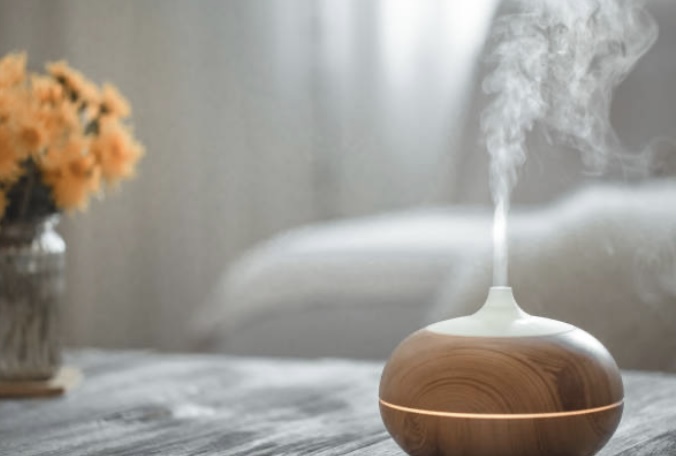
Safety Suggestions for Using Humidifiers, Particularly Around Children or Pets:
Choose a cool-mist humidifier when using around children or pets. Don’t forget to place it out of their reach. Little hands like to grab things and pull on them. Dogs and cats are notorious for knocking things over. As a side note be very careful about putting any kind of essential oils in it around small children and pets. Some essential oils can be quite toxic. Read more here about safety and essential oils with animals. Though an excellent tool to combat colds and allergies, like anything, humidifiers can be misused. Proper maintenance, usage, and selection can go a long way in promoting respiratory health.
Adding moisture to our indoor air has numerous benefits, including improved sleep, healthier skin, and of course, eased cold and allergy symptoms. Adding beautiful scents in the form of essential oils is an added bonus.
Debunking the Abuses and Misuses of Humidifiers
Remember, humidifiers are not a magic cure. They should be used with care, ensuring to maintain recommended humidity levels and cleaning regularly. But they can indeed help immensely when the sniffles decide to show up. It’s just one of many tools in your kit to make a cold disappear. There are so many models and appearances of humidifiers, so you easily find one to suit and blend in with any decor.
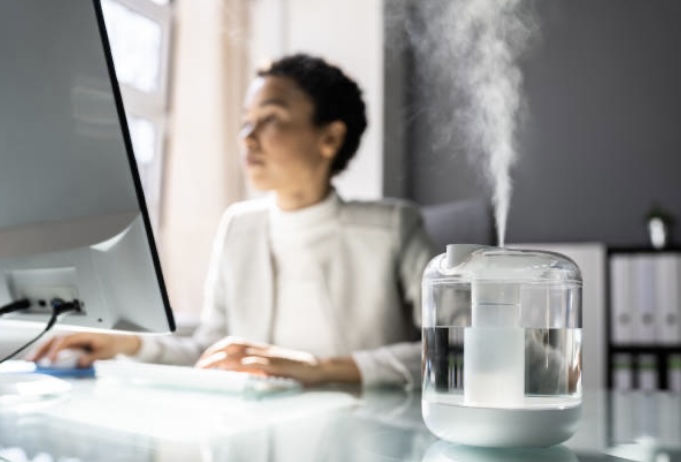
A Look at Humidifiers and Diffusers: What Sets Them Apart?
Isn’t it fantastic to arrive home after a taxing workday to be greeted by a calming aroma that eases your anxiety? Or to breathe easier during the winter months when your skin, nose, and throat feel dry? Humidifiers and diffusers are everyday household tools that can provide these benefits, and while they look similar, they function in distinct ways. In this blog post, we’ll dive into what distinguishes humidifiers from diffusers and the unique roles they play in our home environment.
Humidifiers: Beating Dry Air at Its Own Game
Humidifiers serve a crucial purpose – to add moisture to the atmosphere in your house. During winter, heaters often suck out the moisture from the air, leading to dryness responsible for several discomforts, like dry skin, itchiness, sore throats, and allergy flare-ups. A humidifier releases water vapor or steam to increase the moisture level in the dry air, combating these issues.
So, How Do Humidifiers Work?
The mechanics of a humidifier are pretty simple:
Water in the humidifier’s reservoir gets heated until it transforms into steam.
The device then releases this steam into the air around it.
This process, in turn, increases the humidity levels in the room.
Humidifiers work especially well in enclosed spaces and during cold, dry seasons. That said, it’s essential to balance humidity levels to avoid excessive moisture that could promote mold growth.
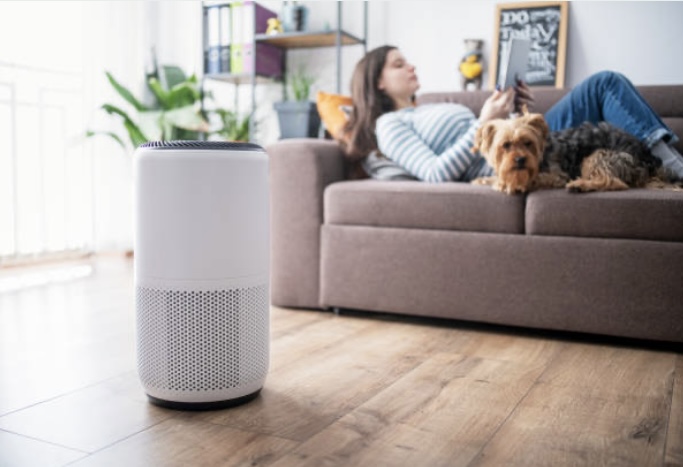
Essential Oil Diffusers: Bringing The Spa Experience Home
Diffusers, on the other hand, primarily cater to aromatherapy. They disseminate essential oils into the environment, creating a delightful, serene, and soothing ambiance. They could be a beneficial addition if you are on a quest for relaxation, improved sleep, or increased focus.
Understanding The Magic Behind Essential Oil Diffusers
Add your chosen essential oils to the diffuser.
The diffuser then disperses these oils into the air as a fine mist.
The aroma from these oils sets a calming and fresh atmosphere.
Note that while diffusers do add some moisture to the air due to the diffusion process, they’re not designed to increase humidity levels substantially like humidifiers.
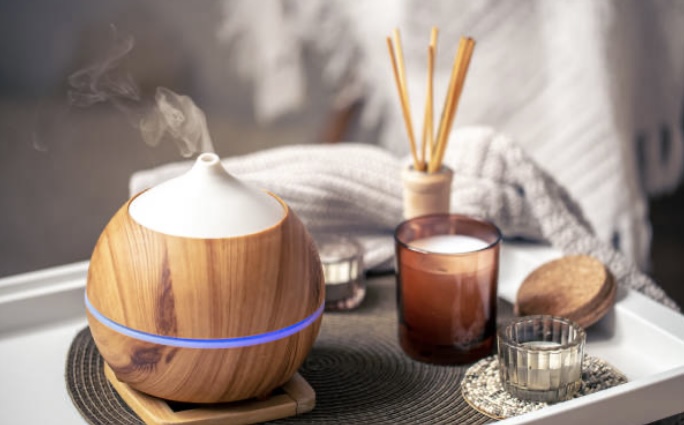
Which One Should You Choose?
Your choice between a humidifier and a diffuser boils down to your specific needs:
If dry air troubles your family leading to dry skin, itchy eyes, and irritated sinuses, a humidifier is the proper tool.
For enhancing mood or enjoying the therapeutic benefits of essential oils, opt for a diffuser.
Some products combine the benefits of both, a humidifier and a diffuser in one unit, should you feel like both their functional perks align with your domiciliary needs. But remember that each gadget offers its unique advantages, and understanding their differences is crucial when deciding to purchase one.
Remember, the goal here is to amp up the comfort level of your living spaces. Whether it’s done through increasing humidity levels or filling your home with serene aromatherapy scents, make sure it suits your needs and turns your home into your ultimate comfort zone.
Frequently Asked Questions
Humidifiers can ease allergies caused by dust mites, pet dander, and molds.
While humidifiers can’t prevent colds, they can make breathing easier and sleep more restful during cold bouts.
Most manufacturers recommend cleaning humidifiers every 1-3 days. When not using it empty and let dry completely.
Not all humidifiers are designed for essential oils. Be sure to check your manufacturer’s manual.
Although generally safe, keep humidity levels in check and ensure it won’t run out of water while you sleep.


